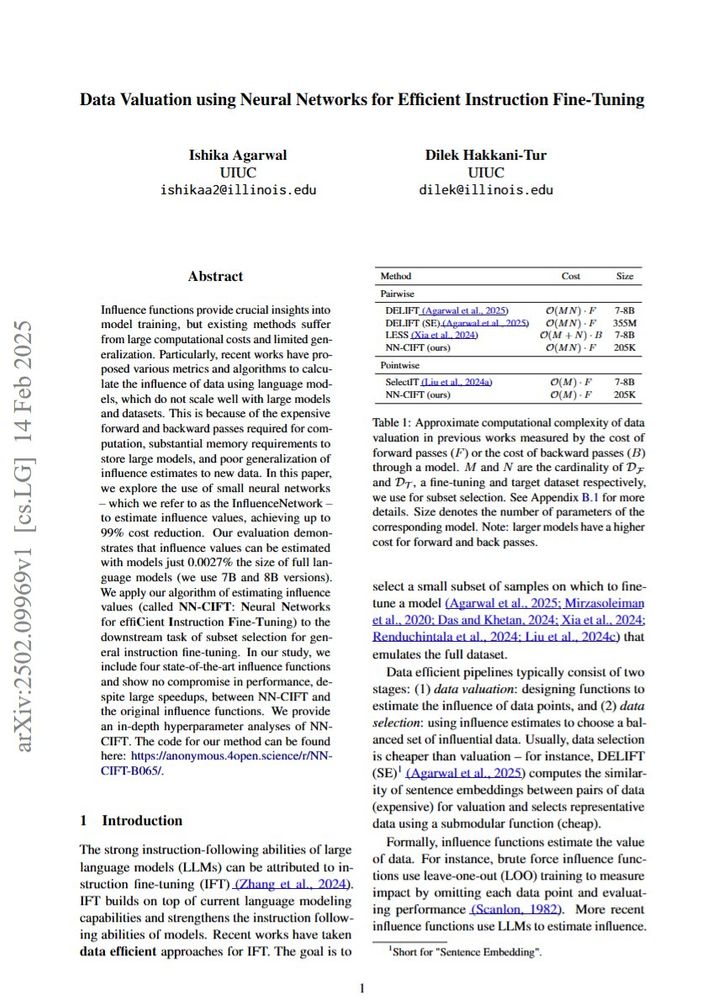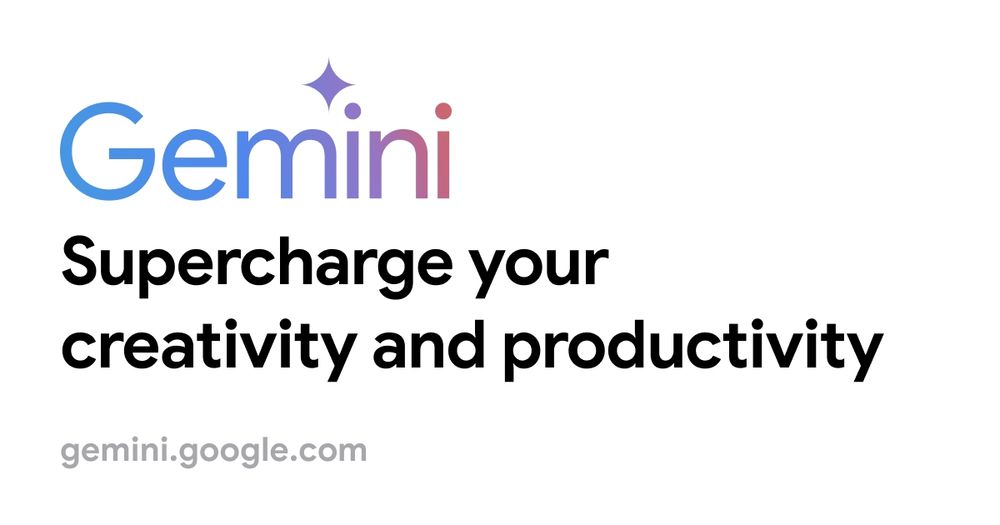6/6 For more details, see:
Paper: arxiv.org/pdf/2502.09969
Code: github.com/agarwalishik...
Thank you so much to @dilekh.bsky.social and @convai-uiuc.bsky.social for their guidance and support during this project 🎉🎉
17.02.2025 04:06 — 👍 4 🔁 0 💬 0 📌 0

5/6 Finally, using our influence values, we pick a small subset & fine-tune the model. In our evaluation, we use 4 SOTA influence functions -- NN-CIFT achieves the same performance while using a model 34,000x smaller!
17.02.2025 04:06 — 👍 2 🔁 0 💬 1 📌 0

4/6 Second, we train the InfluenceNetwork using basic mini-batch gradient descent, then let it estimate the influence for the remaining data. It has a very low error of 0.067!
17.02.2025 04:06 — 👍 2 🔁 0 💬 1 📌 0

3/6 First, the neural network (called the “InfluenceNetwork”) needs to be trained. We compute influence values using existing methods -- but only for a tiny fraction of data (just 0.25%-5%).
17.02.2025 04:06 — 👍 0 🔁 0 💬 1 📌 0
2/6 Estimating the value of data is expensive.
Past works use LLMs to estimate the influence of data -- we use small neural networks to *learn to estimate* influence, instead. This reduces costs and adapts to new data without heavy recomputation.
Here’s how it works:
17.02.2025 04:06 — 👍 0 🔁 0 💬 1 📌 0

🚀Very excited about my new paper!
NN-CIFT slashes data valuation costs by 99% using tiny neural nets (205k params, just 0.0027% of 8B LLMs) while maintaining top-tier performance!
17.02.2025 04:06 — 👍 11 🔁 4 💬 1 📌 1
Elated to announce that DELIFT has been accepted to ICLR'25 🎉 Looking forward to discussing it in Singapore!
23.01.2025 15:46 — 👍 3 🔁 0 💬 0 📌 0
ACL Fellows 2024 | ACL Member Portal
Congratulations to @dilekh.bsky.social for her ACL Fellowship! 🎉🎉🎉 www.aclweb.org/portal/conte...
11.12.2024 14:35 — 👍 11 🔁 2 💬 0 📌 1
Thank you Guneet! Would love to hear more about these stress tests :)
24.11.2024 06:26 — 👍 2 🔁 0 💬 0 📌 0
👋
24.11.2024 00:23 — 👍 2 🔁 0 💬 0 📌 0
Hey! Would love to be added :)
20.11.2024 23:44 — 👍 0 🔁 0 💬 1 📌 0

Can LLMs make us critical thinkers?
TreeInstruct reorients assistant-like LLMs to be instructors that guide students towards understanding their mistakes, without providing direct/indirect answers.
Check out aclanthology.org/2024.finding... (w/ @wonderingishika.bsky.social) to learn more!
19.11.2024 17:23 — 👍 2 🔁 1 💬 1 📌 0
All around the theme of data-efficient NLP:
(1) using influence functions to improve language model performance from less data
(2) enabling language models to generate queries for things it doesn't know
17.11.2024 23:46 — 👍 3 🔁 0 💬 0 📌 0
For more details, see:
Paper: arxiv.org/pdf/2411.04425
Code: github.com/agarwalishik...
Thank you so much to Krishnateja, Lucian, and Marina for their help, mentorship, and guidance during this project! 🎉🎉
17.11.2024 19:25 — 👍 0 🔁 0 💬 0 📌 0

3. Continual fine-tuning: given a fine-tuned model, enabling it to integrate new and complementary information while mitigating catastrophic forgetting. We find that reducing the dataset helps remove samples that hinder performance, surpassing the performance of the full dataset.
17.11.2024 19:25 — 👍 1 🔁 0 💬 1 📌 0

2. Task-specific fine-tuning: given an instruction-tuned model, refining the LLM's expertise in specific domains. We find that pruning the dataset removes noise and keeps relevant examples, achieving better performance than fine-tuning on the full dataset.
17.11.2024 19:25 — 👍 1 🔁 0 💬 1 📌 0

1. Instruction tuning: given a base model, fine-tuning a model to follow general instructions. We find that performance drops are minimal when reducing the dataset by 70%.
17.11.2024 19:25 — 👍 0 🔁 0 💬 1 📌 0
DELIFT quantifies the information present in a sample wrt an LLM's capabilities. Using submodular functions, DELIFT can automatically adapt the chosen subset based on the objectives in the 3 stages of language model fine-tuning:
17.11.2024 19:25 — 👍 0 🔁 0 💬 1 📌 0

I'm so excited to share my latest paper called DELIFT along with Krishnateja Killamsetty, Lucian Popa, and Marina Danilevksy at IBM Research 🎉
We tackle expensive fine-tuning by selecting a small subset of informative data that targets a model's weaknesses.
17.11.2024 19:25 — 👍 8 🔁 1 💬 2 📌 1
TreeInstruct is preferred 78.43% of the time. It solves 14.09% more bugs across all settings, and our questions are 14.18% better at addressing bugs, maintaining relevance, and ensuring logical conversation flow. TreeInstruct also adapts to human students of varying backgrounds.
17.11.2024 19:22 — 👍 0 🔁 0 💬 0 📌 0
TreeInstruct estimates the knowledge a student needs to debug their code and devises a conversation plan. It then dynamically constructs a question tree based on its interactions with the student, navigating the knowledge state space till the student comprehends & fixes all bugs.
17.11.2024 19:22 — 👍 0 🔁 0 💬 1 📌 0
I'd love to be added - thank you!!
17.11.2024 16:45 — 👍 1 🔁 0 💬 0 📌 0
Accessibility Researcher | MHCI @ CMU
associate prof at UMD CS researching NLP & LLMs
NLP PhD Student @ University of Cambridge
NLP/ML @usc, @uwcse. she/her.🏹🤖👩🏻🍳. velocitycavalry.github.io. Multilinguality, retrieval, refining LLMs…
Pure mathematician working in Ergodic Theory, Fractal Geometry, and (recently) Large Language Models. Senior Lecturer (= Associate Professor) at the University of Manchester.
NLP/ML Research. CS PhD @ConvAI_UIUC @IllinoisCDS.
@GTComputing @IITBHU_Varanasi Alum.
Website: https://iamjanvijay.github.io
PhD grad from UofT CompLing. Interested in narrative understanding, affective computing, language variation and style, and generally using NLP technologies to understand humans and society.
priya22.github.io
PhD student @PennState • Multimodal Learning x Affective Computing • ex-Microsoft
PhD @UWaterloo ugrad @HKUST | prev. Google DeepMind @cohere #CLOVA, MPI | ☕️🧗♀️⛷️🎨 | Multilingual | IR author of MIRACL.ai Mr. TyDi
PhD Student @UWCSE. Formerly @MSFTResearch
CS PhD candidate @UCLA | Prev. Research Intern @MSFTResearch, Applied Scientist Intern @AWS | LLM post-training, multi-modal learning
https://yihedeng9.github.io
Professor at UW; Researcher at Meta. LMs, NLP, ML. PNW life.
PhD student @UWMadison | Applied Scientist Intern @AmazonScience AGI Foundations| Human-AI Alignment|Prev Intern @BrownCLPS
{learning,representations, structure} in 🧠🤖
https://scholar.google.com/citations?user=xsyrntwAAAAJ&hl=en
Chief scientist at Robust Intelligence and professor at Yale (on leave)
Visiting PhD at Stanford🌲, CS PhD student at NUS 🇸🇬, PhD Fellow @ Google, NLP researcher📒
https://yocodeyo.github.io
Working on Social Intelligence and Evaluation
PhD student in NLP at GMU w/ Antonios Anastasopoulos. Focus: L2 acquisition, low-resource NLP, psycholinguistics. Passionate about empowering heritage speakers. Berkeley '19
🪸NLP researcher, AI scientist at Deccan AI. Core interests: Computational Social Sciences, Conversational AI, Ai safety and Multilinguality
Modeling Linguistic Variation to expand ownership of NLP tools
Views my own, but affiliations that might influence them:
ML PhD Student under Prof. Diyi Yang
2x RS Intern🦙 Pretraining
Alum NYU Abu Dhabi
Burqueño
he/him
PhD student @jhuclsp.bsky.social











